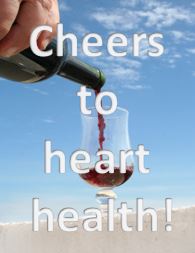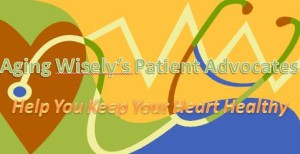Dr. Phillips’ Expert Heart Health Tips
Hello, I’m Dr. Paul Phillips and I’ve been practicing cardiology for over 30 years at Morton Plant in Clearwater. As managing partner of Clearwater Cardiovascular and Interventional Consultants, I’ve worked with thousands of patients throughout Pinellas County. I’m pleased to offer some heart health tips to the readers of Aging Wisely today to help you get a healthy start to 2014!
Every New Year brings a sense of renewal and the potential to change our lives. Unfortunately most New Year resolutions get put on the back burner and quickly forgotten. The goals of losing weight, changing our diets, exercising more regularly and adopting a healthier lifestyle become missing in action. However, with February being Heart Month it is good time to recall some of resolutions and try to lower the risk of future cardiovascular disease.
The epidemic of obesity in our country continues. The reasons include eating more high-calorie processed foods, larger portion sizes, more meals eaten away from home, and less physically active lifestyles. We consume more foods and drinks with added sugars. Portion sizes have increased and the average adult’s daily calorie intake increased by 350 between 1977 and 2005. Many of the meals that are served at restaurants, particularly fast food restaurants, as well as prepared meals bought at grocery stores are high in saturated fats, cholesterol, added sugars and sodium. As a society we spend more time in front of televisions, computers, and video games than ever before. The lack of physical activity places us at risk for diabetes and cardiovascular disease.
Fad diets and appetite suppressants are not the answer to combat these problems. They usually will not lead to sustained weight loss. Unfortunately, getting healthy requires work and discipline. The key is to find a daily eating plan that keeps the pounds off and provides the right balance of calories and nutrition with an appropriate amount of exercise. Although it seems simple the rule is that to lose weight you must take in fewer calories than you use through normal metabolism and physical activity. Don’t expect to lose more than 2 pounds per week. Without increasing your amount of exercise you will need to eat 500 less calories a day to lose 1 pound per week! Try to get at least 30 minutes of exercise daily.
These are some guidelines I suggest to help create a healthy diet:
- Eat a diet rich in vegetables and fruits.
They are high in nutrients and low in calories. Eat whole vegetables and fruits (fresh, frozen, or canned) instead of drinking juices. Prepare without adding sugar, salt, or fats.
- Eat whole grain and high fiber foods.
They can lower your cholesterol level and help you to feel full to help manage your intake. Whole wheat oats, wild rice, corn, barley, and popcorn are good choices.
- Eat fish at least twice a week.
Grill, bake, poach, or broil (don’t fry). Use herbs, spices, lemon, and citrus juices instead of salt, lard, butter, or cream choices.
- Select low fat dairy products.
Use low fat cheeses like mozzarella, Parmesan, and cottage cheeses and use fat free cheeses when available. For desert use frozen yogurts sorbets, sherbets, and fat free ice creams.
- Give up sugar-sweetened soft drinks.
- Limit the amount of food with saturated fat and cholesterol.
- Use oils that stay liquid at room temperature like olive, corn, safflower, and canola.
- Grill, bake, or broil meat and poultry.
- Choose lean and extra lean meats.
- Use chicken without the skin.
- Avoid processed meats i.e. hot dogs, luncheon meat, ham, and bacon.
- Shellfish are acceptable in moderation.
- Avoid trans fats found in margarine or shortening.
- Limit the intake of French fries, cakes, cookies, pies, and doughnuts.
Some other tips to promote weight loss:
- Control portion size.
- Don’t snack between meals or eat anything other than fruits and vegetables after dinner.
- Avoid, bread, pasta, white rice, and potatoes (sweet potato is a better alternative).
Now for some good news! A glass or 2 of wine a day promotes heart health, although wine does have calories you will have to burn off.
Make this a healthy year! Modify your diet, lose weight, get regular exercise, and enjoy some wine.
Thanks to Dr. Phillips for sharing his valuable advice with our readers. Dr. Phillips works with many of our clients and is well known throughout the area for his excellent work as a cardiologist and his contributions to the community. Here is a quick bio about Dr. Phillips: Paul L. Phillips, M.D., F.A.C.C. received his medical degree from the University of Virginia Medical School. His post graduate training continued with an internship, residency, and cardiology fellowship at New York Hospital- Cornell Medical Center. Dr. Phillips has practiced for over 30 years at Morton Plant and is currently managing partner of Clearwater Cardiovascular and Interventional Consultants. He received the Excellence in Medicine Award in 1999 and the teaching award from the Morton Plant Primary Care Program in 2005. He serves as an affiliate professor at the University of South Florida School of Medicine.
In the days leading up to heart month, our Aging Wisely and EasyLiving blogs have been focusing on heart health for elders and caregivers and sharing resources for a healthier lifestyle. We hope these help inspire you towards good health in 2014. If you need any specific information or have a suggestion, we invite you to contact Aging Wisely any time.




 Popular Downloads
Popular Downloads


 Get Our Newsletter!
Get Our Newsletter! Mission Statement
Mission Statement

